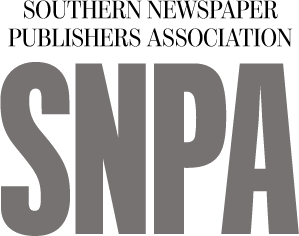N.C. publishers mobilize against independent contractor threat
For over a decade, North Carolina newspapers have enjoyed a legislative presumption of independent contractor status under the state's Workers' Compensation law. This is a tremendous advantage for newspapers in Workers' Comp litigation. In fact, since the passage of this legislative presumption, there has been little – if any – challenge to independent contractor status under the state's Workers' Compensation law.
Earlier this year, legislation was introduced into both Houses of the Legislature to not only repeal the legislative presumption, but to also add independent contractor "unfriendly" language to the statutory test for independent contractor status.
Under the leadership of North Carolina Press Association President Regina Glaspie, publishers mobilized to oppose this legislation. Publishers attended legislation sessions in person, and reached out to legislators via telephone, e-mail and social media. A full-court press occurred.
At least one newspaper editorialized against the bill, making a First Amendment argument:
"At risk of sounding paranoid, it seems the most recent Senate changes to H.B. 42 target only newspaper publishing. In fact, newspapers have been a frequent Senate target in the last couple sessions, including a measure that added a tax on newspaper sales, a move that also impacted newspaper customers. We strongly suspect that the moves are in retaliation for stories or editorials political leaders neither like nor agree with. Such actions are the antithesis of an unfettered press granted by the U.S. Constitution."
On Sept. 29, the publishers were successful – the bill died at the end of the legislative session.
As general counsel to the Mid-Atlantic Circulation Managers Association (a newspaper circulation trade association for North Carolina, South Carolina and Virginia), I advised and assisted the North Carolina Press Association during this important fight, urging the publishers to make the First Amendment arguments. Following the recent victory, Glaspie noted, "Thanks for all of your help. You were here with us for our long battle."
NLRB general counsel to allow unions to use electronic signatures
On Sept. 1, NLRB General Counsel Richard Griffin issued a memorandum directing all NLRB regional offices to accept electronic signatures in support of the showing of interest required of unions filing election petitions to organize employers. The general counsel's directive provides that a "signature" can include various forms of electronic identification, including e-mail exchanges or Internet/Intranet signup methods.
This new directive is clearly designed to assist unions. It compliments the NLRB's "quickie election" rule finalized on April 14. General Counsel Griffin stated that electronic signatures should be accepted where the electronic signature method chosen by the party provides the regional director with prima facie evidence: (1) that an employee has electronically signed the document purporting to state the employee's views regarding union representation, and (2) that the petitioning union has accurately transmitted the document to the region. The electronic signature submitted by the union will be presumed to be valid.
To be accepted, the electronic signature must contain the following information:
- The signer's name.
- The signer's e-mail address or other known contact information (e.g. social media account).
- The signer's telephone number.
- The language to which the signer has agreed (e.g. that the signer wishes to be or no longer wishes to be represented by the union for purposes of collective bargaining).
- The date the electronic signature was submitted.
- The name of the employer of the employee.
The union submitting electronic signatures must submit a declaration with the following information:
- An identification of the electronic signature technology that was used.
- An explanation how its controls ensure that the electronic signature is that of the signatory employee, and that the employee him or herself signed the document.
- Proof that the electronically transmitted information regarding what and when the employees signed is the same information seen inside by the employees.
The general counsel's memo makes clear that all a union needs to do is set this up on its website, and that its declaration in support of its petition states:
"Each individual went to the website we set up. They filled out their names, e-mail addresses, phone numbers, and employer name on the form with language indicating that they wished to be represented for collective bargaining purposes by the union and clicked on 'I agree.' The electronic signature we are providing identifies the signing employee because that's what they typed into the form. We are logging the date and time of each session along with the IP address; we are submitting the summary of the logs to you as Exhibit A. We also sent a confirmation transmission to the address provided by the employee."
It is readily apparent to this writer that there is a much greater potential for fraud, forgery and mistaken signatures with the use of electronic signatures. Yet, despite these concerns, electronic signatures submitted by a union will be presumed to be valid by the NLRB.
Tweet, tweet away the union victory
Adjunct faculty members at Webster University signed an election petition to be represented by Service Employees International Union. The elections were held via casting mail-in ballots between April 24 and May 8. The vote tally revealed two votes in favor of the union and two votes against it, with one vote favoring the union being challenged by the university.
Andrea Miller, an adjunct professor in the Gender Studies Department, posted a photograph on her Twitter account, depicting her filling out the ballot and voting for the union. This "tweet" was public for everyone to see. As a result, the university challenged Miller's ballot.
The NLRB regional director sustained the challenge because the Twitter post destroyed the secrecy of Miller's ballot, which resulted in a majority of the valid ballots not being cast in favor of the union. The ballot photograph is still on Miller's Twitter account, serving as a reminder to monitor social media during an election for potential challenge avenues.
Treats to kill managers not protected
Mayo was a welder at PCC Structurals, a company that manufactures aircraft parts. He began to have disagreements with his supervisors and complained to human resources. After a meeting with human resources, Mayo began making threatening comments around his coworkers, stating he "felt like coming down to PCC with a shotgun and blowing off the heads of the supervisors." He made these types of comments on at least five occasions.
Mayo's coworkers reported these outbursts to management. Human resources interviewed Mayo about his complaints, where he stated he "couldn't guarantee he wouldn't do that." He was immediately suspended and barred from company property. A police office came to Mayo's house, and he was voluntarily committed to a psychiatric hospital. He then took leave under the Family and Medical Leave Act, until he was cleared to return to work. Mayo was terminated shortly thereafter.
Mayo filed suit in the U.S. District Court for the District of Oregon, alleging a violation of the Americans with Disabilities Act, and that he was terminated because of his disability, which was discriminatory. The District Court granted PCC's motion for summary judgment, and Mayo appealed to the 9th Circuit. The 9th Circuit found that Mayo was "not a qualified individual."
The court noted, "An essential function of almost every job is the ability to appropriately handle stress and interact with others." It further stated, "[The ADA] does not require that an employee whose unacceptable behavior threatens the safety of others be retained, even if the behavior stems from a mental disability." The court found, "Mayo's credible, detailed, and unwavering plan to kill his supervisors more than adequately demonstrated that he lacked the ability to appropriately handle stress and interact with others."
Mayo's claim was dismissed.
Independent contractor status upheld
Barcus was a freight truck driver who delivered freight for CEVA Logistics. Barcus claimed he was injured while delivering freight and filed for Workers' Compensation benefits. His claim was denied by the hearing officer and refused on appeal to the Industrial Commission. Barcus then appealed to the trial court of the Franklin County Court of Common Pleas.
The trial court granted CEVA's motion for summary judgment, finding that reasonable minds could only conclude that Barcus was an independent contractor. Barcus then appealed to the Court of Appeals of Ohio, 10th Appellate District, alleging error – that the trial court improperly granted summary judgment.
The Court of Appeals reviewed the case to determine whether reasonable minds could not differ on the facts making Barcus an independent contractor. The court found that the following factors indicated independent contractor status:
- Barcus had a written independent contractor agreement and a lease agreement for his truck.
- Barcus was free to accept or reject deliveries and loads.
- Barcus could employee other persons to assist him in performing his contractual obligations.
- Barcus could choose his own route for delivery.
- The term of the contract agreement was one (1) year and renewed automatically.
- Barcus was paid 65 percent of the total amount every other week.
- Barcus was free to work with others, as long as he covered up CEVA logos on the truck and notified CEVA.
- Barcus received IRS Form 1099 at the end of the year.
- Barcus leased his truck and was responsible for all maintenance and insurance, as well as any repairs.
The court noted that the fact that Barcus was required to purchase a white truck, wear a uniform and affix CEVA logos on the truck weighed in favor of employee status. However, the fact that federal regulations required the logos and uniforms meant that this factor was not given weight. The court concluded, "Measures undertaken to comply with federal regulations do not demonstrate the control needed to establish an employer/employee relationship."
The Court granted CEVA's motion for summary judgment.
 |
L. Michael Zinser is the founding partner of The Zinser Law Firm in Nashville, Tenn. The firm, which has a heavy concentration of clients in communications media, represents management in the area of labor and employment. Zinser can be reached at (615) 244-9700 or mzinser@zinserlaw.com.






